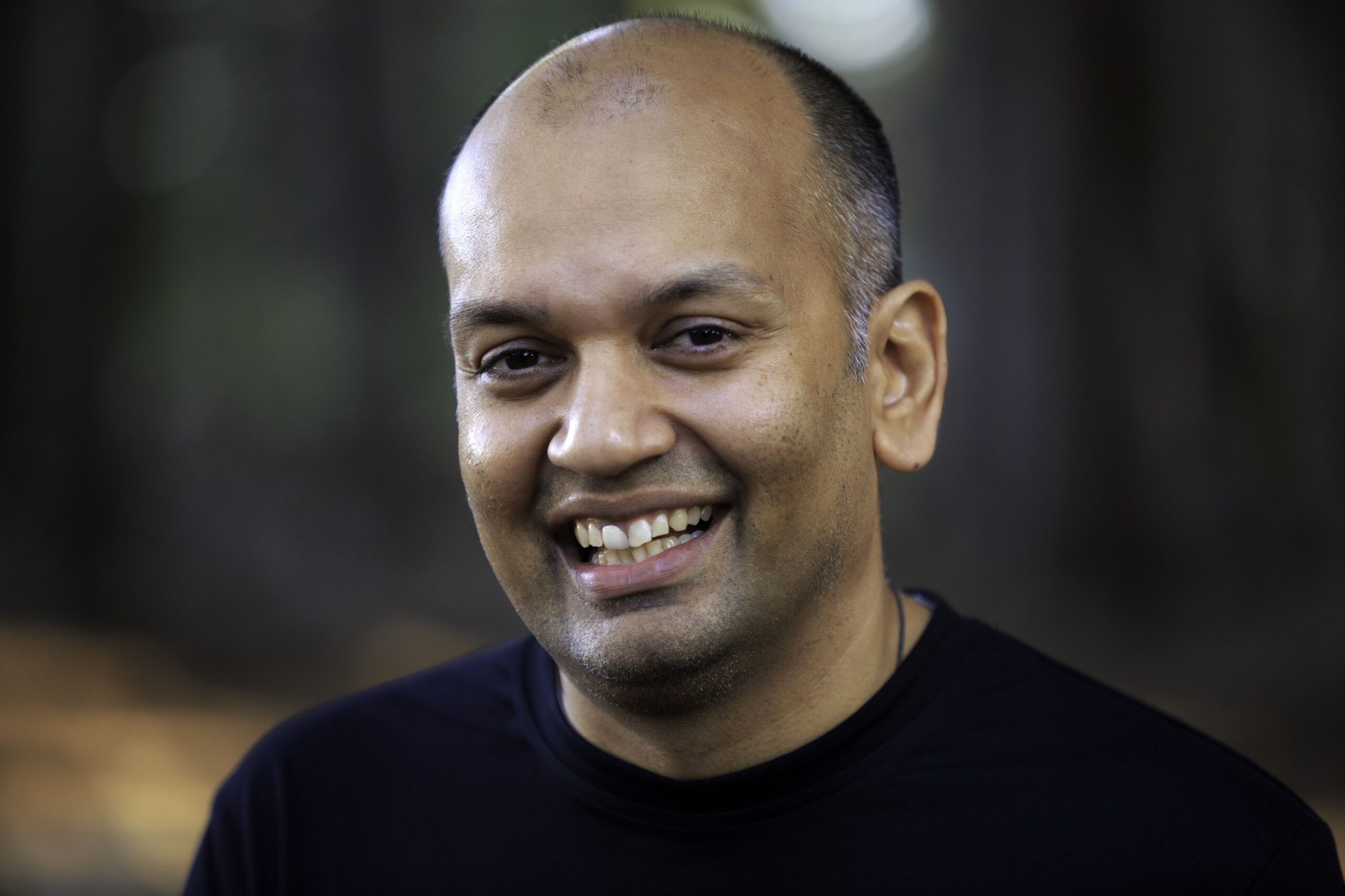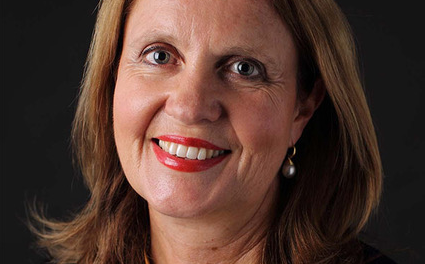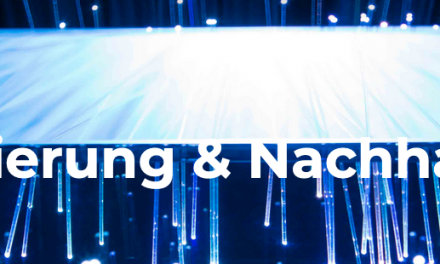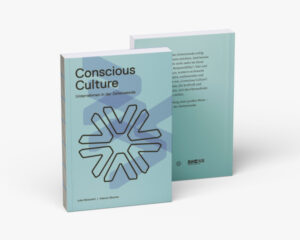Nipun Mehta
is the founder of ServiceSpace
Reading Time: 7 minutes
Since the launch of ChatGPT, the world has been gripped by AI fever across the spectrum. From surprise at the unimagined possibilities in its use for programming, texting, image creation, and even cheating in school, to fear over job loss in many professions and the end of humanity, all emotions are present. But how can we integrate artificial intelligence into our lives in a meaningful way and avoid a similar proliferation that social media started in people’s lives? Becoming aware of forms of human intelligence apart from IQ and working to spread them into the AI realm as well is the answer of Nipun Mehta, founder of ServiceSpace.

Is Artificial intelligence the end of human IQ?
Predictions about the future progress of AI are unclear. What is certain, however, is that development is proceeding exponentially. AI is already outperforming human performance in more and more areas, and if it can’t yet replicate the comprehensive versatility of human intelligence, it’s only a matter of time. After all, machine learning happens 24 hours a day, seven days a week and is making great strides. And the access to AI is not only increasingly available and usable in professional settings, but has long and almost imperceptibly infiltrated private lives. The benefits of analyzing and linking Big Data using self-learning algorithms are great for businesses and are experienced by many as an innovative improvement. Yet, there is no demarcation to a purely professional functional environment, simply by the many companies using AI for B2C. Soon, then, artificial intelligence will be able to produce everything that our human IQ normally produces. Human IQ may thus be a discontinued model, says Nipun Metha.
In this context, many profound questions arise, so Nipun. How is what distinguishes us as human beings, our compassion, or selflessness, for example, mapped? What happens to subtler, and more profound, forms of creativity? Maybe it’s not just about producing books – because AI can already do that. Nor is it just about producing art or music – AI can do that, too. “I think we humans create context through our physical presence, awareness, and intention,” Nipun says, “These human qualities are increasingly needed in a world where computing power is growing exponentially.”
The human experience is rooted in several forms of intelligence. The IQ is one of them, but the heart, for example, also has its own intelligence, we even have scientific proof of that, found for example by the findings of the heart math institute (www.heartmath.org), the ServiceSpace founder knows. There are many expressions of intelligence that we humans naturally feel intuitively. It is now the task of humanity to become aware of these and to cultivate them more intensively.
Bridging the gap between algorithm and intuition
Establishing the relationship between AI that generates IQ-primed content with beyond-IQ human capabilities could open us to a hybrid solution, Nipun explains. Algorithms help to process and make sense of Big Data; for example, if you were to look at the actual amount of data of route information from GPS, it would be overwhelming and unusable. Algorithms make the data user-friendly. But they can only process Big Data.
“But what about Deep Data?” asks Nipun.
“Our human apparatus can process Deep Data, which surrounds us at every moment, and turn it into something meaningful using our own native, evolutionary algorithms, which we often access as intuition.”
When two people talk to each other, much more is exchanged than just the words that are spoken. True, an AI-bot might process the words. But the other exchanges, the presence of the two people, their emotions and the tonality that resonates in the words, the way they sit and the way they look into each other’s eyes, the way they move their hands while talking and whether they are serious, amused or bored, is Deep Data that every human is processing all the time, even though we may not be aware of it.
“The ‘algorithm’ for understanding Deep Data is human intuition.”
Nipun Mehta
From Metaverse to Mettaverse
“We are at a crossroads,” is Nipun’s opinion. People can now contract and hide in fear, fearing for their jobs and closing themselves off to the uncertain future. Another option, though, would be to lean into the unknown with a heart full of possibility and ask questions like: What does the impact of artificial intelligence mean for our lives?

Being human means not only producing answers to tasks and creating content, but also enabling context. To provide context, however, one must not only work with transactional IQ-related resources, but combine different forms of intelligence. If we act out of fear and limit ourselves to purely transactional interactions, we run the risk of becoming isolated and alienated.
Or, as Nipun puts it, can we move from Metaverse to Mettaverse? “Metta” is the Pali (liturgical language of Buddhism) word for love and kindness. In Metta energy, you expand because you connect with others and create a relational field. Thus, one plus one becomes greater than two – because the plus sign – the way how we relate – has tremendous value. However, igniting this holistic value that is “greater than the sum of the parts” can only mature when we are connected. That requires us to move from isolation and fear to trust and love.
AI has the potential to infiltrate many areas of our lives, but especially our intimacy. When the sense of this trust is lost, fear and loneliness take hold of people. Avoiding this development requires awareness and strategic action. “I don’t think we have the option to exclude artificial intelligence from our lives,” says the ServiceSpace founder. AI combined with digitalization creates improvements in many economic areas. But what happens on the personal level? We are already heavily interwoven with AI through our cell phones, in some cases unnoticed, and these aspects will soon become even more prevalent in many parts of our lives.
Lessons learned from the mistakes of using social media
“If social media has hijacked our attention, I think AI – in the worst-case scenario – will hijack our intimacy,” fears Nipun Mehta. Becoming aware of the impact and targeting this interaction is therefore the need of the hour. When social media entered people’s lives, we thought we had increased our circle of friends – but actually, it just ended up devaluing our idea of friendship. We never understood its addictive nature, and hence couldn’t draw a healthy boundary around it. The consumption of social media releases dopamine, endorphins, oxytocin, and serotonin. Such “happiness hormones” are also emitted while gambling and drinking, for instance. That’s why we have laws to engage responsibility. But when it comes to using social media, we have essentially opened the bar for 8-year-old kids, says Nipun Mehta. That’s partly because we didn’t understand the implications ourselves initially and the development was moving fast. “Only the thing is that now we are moving even faster. If TV took 75 years to get to 100 million users, ChatGPT took 5 days!”
Nipun then asks, “How will we design mindfully, learn to draw healthy boundaries and proceed with a deeper ethic of leading with relationships? And more broadly, can the AI personalities we create deepen our experience of being human?”
If the use of AI remains only profit-oriented, the same mistakes that were made with social media will be repeated, but with far worse consequences. The history of social media technologies has in many ways been a story of unintended consequences, even the founders of the platforms agree. That’s why it’s necessary to take a more critical look at how things have evolved and take countermeasures. After all, when introducing a new technology, Google’s CEO declared on national television that one should expect unintended consequential reactions, as the AI has accidentally learned Bengali even though no one instructed it to do so. That is cause for concern, says Nipun Mehta. It becomes clear that a different engagement and counteraction is called for. And in the process, alignment with the deepest human values of connecting and caring for each other needs to be considered.
ServiceSpaceGPT – Compassionate AI
The ServiceSpace ecosystem’s answer is to introduce a GPT that takes human values into consideration. The ecosystem includes an extraordinary collection of data, from Service Space content, of outstanding thought leaders and day-to-day-heroes of the last 25 years. It consists of various websites and services and provides insights and stories that touch on various areas of life, stories about kindness, selflessness, learnings about connecting to yourself, others and something higher than yourself, as well as scientific findings about the neural effects of the brain when practicing gratitude and serving.
The search results that ServiceSpaceGPT presents are not based on keywords, as is usually the case. Instead, the AI provides answers in the context of all that information. For example, the question of a nine-year-old girl, daughter of a ServiceSpace volunteer: How can I remain kind and friendly when others are mean to me?
The AI gave an astonishing answer that combined the total knowledge from all the ServiceSpace content. “It’s fascinating to see the potential this holds,” Nipun Mehta enthuses.
With the successful launch of this kind of chatbot, which includes ServiceSpace’s extensive library, they plan to create more such bots for other thought leaders and content creators that are contributing to a pro-social narrative in the world. Additionally, RLHF (Reinforcement Learning from Human Feedback) will be used to co-create intelligence that leverages big data with human intuitions with the aim of integrating that collective data set into the larger language models. For cultivating a broader design principle of integrating various forms of intelligence, various gatherings with indigenous elders and tech innovators – in wide-ranging locations from Silicon Valley to Japan to India are being held.
Learn more:
ServiceSpaceGBT (login is required),
ServiceSpace Pod,
Nipun Mehta, ServiceSpace
About:
Nipun Mehta founded ServiceSpace, an incubator of projects working at the intersection of technology, and the gift economy. What started 20 years ago in Silicon Valley has grown into a global ecosystem with over 1.5 million members who have delivered millions of dollars in free services. Nipun has received manifold awards, including the Dalai Lama’s Unsung Hero of Compassion award, and in 2015 was appointed by President Barack Obama to the Council on Poverty and Inequality. He serves on the advisory boards of the Seva Foundation, the Dalai Lama Foundation, and the Greater Good Science Center.
Foto Nipun Metha, photocredit manuelgruber.me














